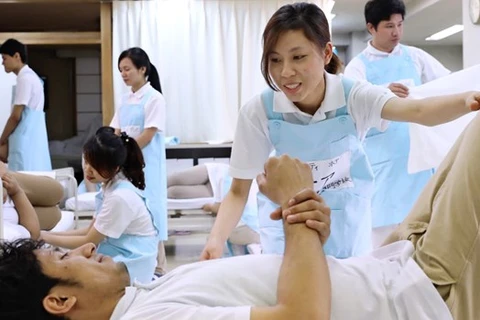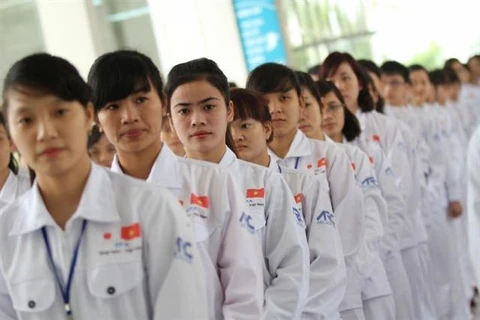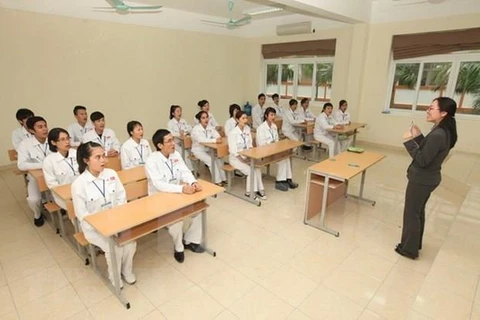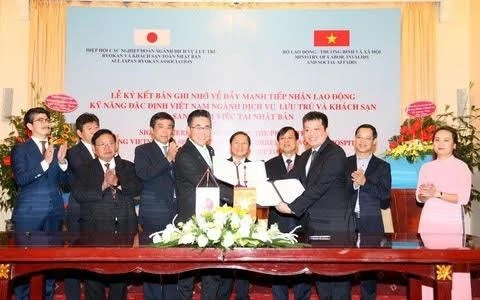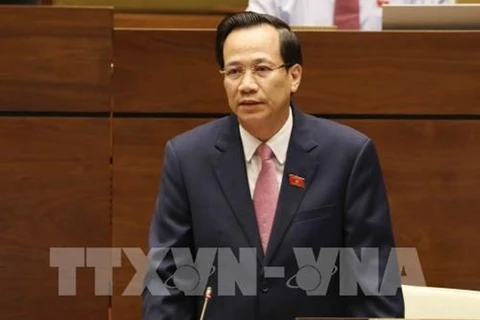 Officials of the Ministry of Labour, Invalids and Social Affairs and Kanagawa prefecture exchange the signed MoU on human resource development (Photo: VietnamPlus)
Officials of the Ministry of Labour, Invalids and Social Affairs and Kanagawa prefecture exchange the signed MoU on human resource development (Photo: VietnamPlus) Hanoi (VNA) – Vietnamese labourers will have more job opportunities and receive support to integrate into local society in Kanagawa prefecture of Japan under a freshly inked memorandum of understanding (MoU) on human resource development.
Officials of the Ministry of Labour, Invalids and Social Affairs (MoLISA) and Kanagawa signed an MoU on human resource development in Hanoi on November 19.
There are about 16,000 Vietnamese in the Japanese prefecture at present. The Vietnamese community in the country has always received favourable conditions in terms of employment and integration into the local life.
The MoU sets up a cooperation framework between the two sides in sending and receiving engineers, technicians, apprentices, labourers with Japan’s vocational certificates, and vocational students in the fields of shared concern.
[Japan largest market for Vietnamese guest workers]
Accordingly, in the short term, the two sides will cooperate in the fields of health care and caregiving. After that, they will discuss the expansion of their ties to other spheres after reaching consensus on related conditions.
Additionally, they will also support labourers in the agreed fields to come to learn skills and work in companies, establishments and organisations in Kanagawa.
Kanagawa Governor Kuroiwa Yuji affirmed that for the labourers his prefecture receives and their families, the local administration will create conditions for them to integrate into the local community by providing advisory services and Japanese teaching programmes.
The MoU is valid for three years, starting on the date of signing, and can be extended by mutual agreement of both sides.
 In the first phase of the MoU, the two sides will cooperate to send labourers working in the fields of health care and caregiving to Kanagawa (Photo: VietnamPlus)
In the first phase of the MoU, the two sides will cooperate to send labourers working in the fields of health care and caregiving to Kanagawa (Photo: VietnamPlus) Addressing the signing ceremony, MoLISA Deputy Minister Le Van Thanh stressed that the MoU signing will further help to promote the two countries’ cooperation in labour and human resource development.
He expressed his belief that on the basis of this document and the close collaboration between the two sides, more young Vietnamese people will have chances to study and work in Japan, and when they return, they will contribute to Vietnam’s development as well as the nations’ friendship.
Aside from Kanagawa, some other Japanese localities have also partnered with Vietnam in human resource development.
In mid-March, the MoLISA and authorities of Chiba prefecture signed a MoU (MoU) on human resources development, which established a cooperation framework in sending and receiving engineers, technicians, skilled trainees, and vocational students in the fields of shared interest.
In August, the ministry and Nagano prefecture also inked a similar document.
According to Deputy Director of the MoLISA’s Department of Overseas Labour Nguyen Gia Liem, Taiwan (China) and Japan are the traditional and also biggest markets of Vietnamese labourers as they have been the destinations of more than 90 percent of Vietnam’s total guest workers in the recent past.
Japan is the most potential market at present, he noted, elaborating that it not only offers good salary but also provides numerous job opportunities for skilled workers.
The Northeast Asian country now has demand for over 345,000 foreign labourers in such fields as caregiving for the elderly, hospitality industry, electricity, electronic information, automobile maintenance and repair, aviation ground services, restaurant services, construction, shipbuilding and agriculture, Liem said.
At a workshop held in Quang Ninh province on October 4, MoLISA Deputy Minister Nguyen Thi Ha said up to one million workers have decided to work overseas under official contracts since 2006.
Labour export has helped to alleviate the burden of creating jobs for the country’s young and dense population, which provides employment for approximately 10 percent of the workforce, she said./.
| There are more than 330,000 Vietnamese people across 47 prefectures of Japan at present, making them the third largest foreign community there. So far, Vietnam has sent over 250,000 apprentices to Japan, including 64,429 in the first 11 months of 2019, statistics show. |
